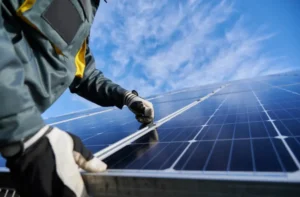Did solar panels on home will make a big difference in energy bills?
Yes, solar panels on home will make a big difference in energy bills. You will still receive an electric bill whenever you install solar panels. Notably, the bill might not ask you to pay something and should merely indicate how your utilization was offset by net metering credits for the month. When you provide extra electrical energy to the grid than you pull, your utility will often roll over your unused bill credit to the next month so that you can benefit from it. Regardless, installing solar panels on home will almost certainly result in a lower average month-to-month electrical bill and may eliminate your month-to-month electric bill in some cases.
What are the benefits of solar panels on home?
The largest benefit of getting solar panels installed is that you’ll save on electrical energy prices. If your solar panels are large enough, you might be able to produce sufficient electrical energy for your entire house.
One other profit is that you’ll be lowering your carbon footprint. According to carbonneutral.com.au, 1kW of solar energy produced is equivalent to 1kg of c02 avoided*.
Do solar panels affect the electricity supply?
If your solar panels are installed accurately, your system should switch seamlessly between utilizing the electrical energy your solar panels on home have generated to utilizing power from the Utility Grid when the panels are usually not producing sufficient. You won’t notice any distinction in your electricity supply.
You should utilize your solar panels alongside a normal energy tariff, and there’s no need to inform your energy company. You’ll simply use much less electrical energy from the grid and subsequently pay lower bills. However, it’s best to shop around to ensure your tariff is competitive.
How long does it take to recoup the prices?
Depending on the size of your solar energy system and any money you earn by exporting extra energy again to the grid, you may anticipate reimbursing the prices of solar panel installation after 3-5 years.
Though larger systems are costlier, they generate extra energy and might save you extra in the long term.
Can you earn money from solar panel system?
Many electricity retailers have introduced a feed-in tariff. A feed-in tariff pays you for the extra electrical energy generated by your solar PV system and not used in your home.
Under a net feed-in tariff, a price is paid for any solar power system that goes again into the grid from your own home. So, in case you are producing extra electrical energy from your solar panels than you are using, you receive a commission for this extra electrical energy that is sent into the grid. And for those who use the entire energy you generate will likely be offset against your normal electricity bill.
How do Feed-in tariffs work?
Feed-in tariffs for renewable energy pay for extra electricity generated by small-scale solar photovoltaic (PV) or wind power systems. The amount paid varies between different retailers.
To obtain a feed-in tariff, a solar PV system should be:
- installed on a residential property or small-businesses
- connected to the grid throughout the National Energy Market (NEM).
Financial assistance to help with the price of installing a small-scale solar system under the Australian Government’s Small-scale Renewable Energy Scheme (SRES) may also be accessible.
Make this the year you finally go solar with AYKA Solar. Find out more specifics about how you can lower your electric bill and help the environment. Contact us today and get your solar panel quote. We assure you a high-quality solar panel installation done with the most reliable solar installer for your future solar panel savings.
Source: https://www.energy.gov.au/rebates/electricity-feed-tariff





